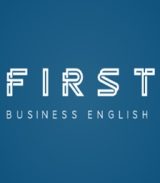
Branding In Business
- Posted by Ryan Anthony
- Categories B1-B2 Lesson Blog, Blog
- Date April 9, 2025
First Business English know that in today’s competitive global market, branding plays a critical role in the success of a business. A strong brand helps a company stand out, build trust, and attract loyal customers. For business English learners regardless whether you’re launching a new business or managing an established company, understanding branding is key to building long-term success. In this First Business English article we determine what branding is, and the importance of branding in business. We also provide you with key vocabulary and common phrases used when discussing branding and an example paragraph to get you started talking about your own organizations brand and branding aspirations.
What Is Branding?
Branding is more than just a company’s logo or slogan. It refers to the identity, reputation, and emotional connection a business creates with its customers. It includes the company name, logo, colors, messaging, values, and customer experience. A well-defined brand communicates what the company stands for and what makes it different from its competitors.
Why Branding Is Important
-
Recognition: A strong brand is instantly recognizable and helps customers remember a product or service.
-
Trust and Credibility: Consistent branding builds trust and makes your business look professional.
-
Customer Loyalty: People are more likely to return to brands they know and like.
-
Market Positioning: Branding defines where you stand in the market compared to your competitors.
-
Value Perception: A strong brand can increase the perceived value of a product or service.
Useful Vocabulary
-
Brand Identity – how a brand presents itself to the public
-
Brand Loyalty – when customers consistently prefer a particular brand
-
Rebranding – changing the image of a business or product
-
Brand Awareness – how well people know a brand
-
Tagline – a short phrase that represents the brand’s message
-
Positioning – how a brand is seen in relation to competitors
-
Target Audience – the group of people the brand is aimed at
-
Brand Message – the core idea the brand wants to communicate
Common Phrases
-
“We’re working on strengthening our brand identity.”
-
“This product is aimed at a younger target audience.”
-
“The company recently went through a complete rebranding.”
-
“We need to increase brand awareness in the international market.”
-
“What message do we want our brand to communicate?”
-
“Our branding strategy focuses on innovation and sustainability.”
Example Paragraph
Our company recently launched a new line of eco-friendly office supplies. To differentiate ourselves from competitors, we focused heavily on branding. We developed a clean and modern logo, chose green tones for all packaging, and created a tagline: “Sustainable Solutions for Smarter Work.” Our target audience is environmentally conscious professionals, and our branding strategy emphasizes our values of sustainability and innovation. As a result, brand awareness has increased significantly in the past six months, and we’ve started building strong brand loyalty among our customers.
Conclusion
In the business world, branding is not just about looks—it’s about the message, reputation, and values behind the company. A strong, consistent brand helps businesses attract the right audience and grow in a meaningful way. For business English learners, learning the vocabulary and phrases used in branding, you can communicate your business ideas more effectively and understand how to build a powerful brand image. To learn more or to practice your business English language skills simply book a lesson with us at First Business English.
About First Business English
First Business English is a premium business English language online education center that provides individuals and groups the opportunity to learn Business English that enhances their careers and lives through a structured Business English curriculum. Contact Us
Ryan Anthony is an enthusiastic, self-motivated, reliable Online Business English language tutor who is learner focused and highly adaptable. Bachelor of Business Studies Degree educated with extensive IT Support, Call Centre Management, Retail Management and English Language Teaching experience.
You may also like

The Pros And Cons Of Freelancing As A Career

The Effect Of Prices And The Cost Of Living

